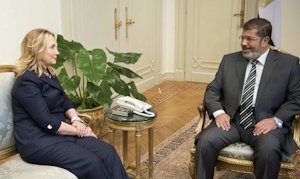By Pinhas Inbari
US Secretary of State Hillary Clinton was motivated by a complex set of reasons to visit Cairo and Jerusalem last week. Her most important goal, however, was to bestow legitimacy upon the newly elected president of Egypt, Mohammad Mursi, in order to tip the scales in his favor in the internal struggle between the Muslim Brotherhood and the Supreme Council of the Allied Forces (SCAF).
 Clinton was quick to congratulate Mursi during her visit to the presidential palace in Cairo, while calling on the SCAF to submit to the authority of the elected civil rule and return to the army barracks as the defenders of the country. In Israel, she attempted to reassure Israelis and calm their concerns about Mursi's intentions by rightly telling Jerusalem that the new ruler on the Nile would be preoccupied with the economy.
Clinton was quick to congratulate Mursi during her visit to the presidential palace in Cairo, while calling on the SCAF to submit to the authority of the elected civil rule and return to the army barracks as the defenders of the country. In Israel, she attempted to reassure Israelis and calm their concerns about Mursi's intentions by rightly telling Jerusalem that the new ruler on the Nile would be preoccupied with the economy.
Washington is now expected to offer Israel its matchmaking services between Jerusalem and the Muslim Brotherhood. While the possibility of a dialogue with the new government in Cairo is attractive to Israel, it must also carefully consider whether opening a channel with the Muslim Brotherhood, who will never recognize the Jewish state, might come at the expense of its relations with the SCAF and jeopardize the possibility of getting closer to Egyptian liberals.
Secretary Clinton went even further in her efforts and arranged an audience for Palestinian President Mahmud Abbas with Mursi in an effort to legitimize the Muslim Brotherhood rule in Egypt. Abbas, in turn, was doubly gratified by his short trip to Cairo. It preceded the arrival of Hamas Prime Minister, Ismail Haniyeh, and gave the Palestinian Authority legitimacy from the new president of Egypt, who is a product of the Arab Spring. Abbas found himself in a highly perilous situation during the regional uprising as he was associated with the “old rule” à la Mubarak. His sit-down with Mursi supplied him with a stamp of approval and signaled his legitimacy to the Palestinian street.
Secretary Clinton’s quest to legitimize the newly-minted Egyptian President did not end with Abbas. She arranged another meeting for Mursi with King Abdullah of Saudi Arabia. Saudi Arabia faces the same dilemma as Israel, for it suspects that aiding Mursi may entail the abandonment of the SCAF and the empowerment of the Muslim Brotherhood and its reach across the Middle East.
After the meeting with Mursi, the Saudis sent a clear message that they would not assist the government in Cairo by appointing Prince Bandar bin Sultan as Director General of the Saudi Intelligence Agency. Prince Bandar in famous for his staunch opposition to Iran and the Shia and for his negative approach to Hamas due to its strong affiliation with Iran and allowing a Shia mission in Gaza that has already converted Sunnis to Shia. Indeed, the Saudi attitude toward Egypt was confirmed last weekend by the London-based al-Quds al-Arabi, which asserted that Saudi Arabia would not open its doors to Mursi.
A day after Mahmoud Abbas’ visit Mursi, a high-level Hamas intelligence officers’ delegation led by Khaleed Mashal was also received in the presidential palace, duly deleting the impact left but Abbas' presence. The delegation’s visit was a historic turning point in modern history, as it marked the first time Hamas leaders were permitted to enter the palace. This week, it is Hamas Prime Minister Ismail Haniyeh who is scheduled to call on Morsi.
Cairo also announced that Mursi would travel to Tehran on the occasion of the Non-Aligned Movement conference. The Saudis will carefully monitor his steps to see if Mursi confines himself to the conference or behave as an Egyptian president honoring the ayatollahs in a semi-formal visit.
The Saudis will also watch to see whether Mursi takes the Fatah-Hamas "reconciliation" file from the SCAF and personally lead the mediation. Should these efforts be accepted by Abbas, who would then have to abandon the SCAF, Morsi will lose whatever meager aid Saudi Arabia might have allocated his way.






